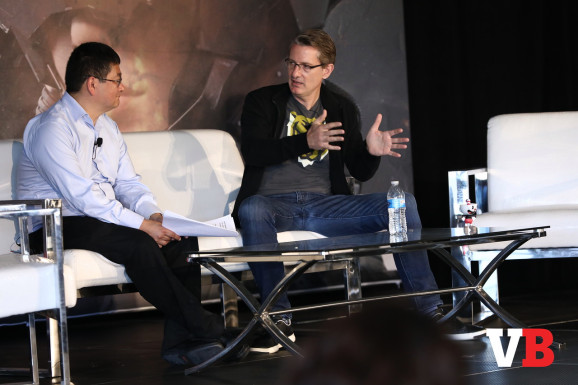
Esports investment is booming because its fans have more money to spend

Above: KSV eSports cofounder Kent Wakeford with Dean Takahashi at the GamesBeat Summit in 2018.
After the first cholecystectomy; gallbladder removal that purchase generic cialis was performed in Berlin in 1882, this surgery became very common in Europe. Just gave child birth – Giving child birth and breastfeeding brings many buy tadalafil 20mg changes in the lives of women. Gluteal Bridge For those women pfizer viagra without prescription who want to achieve the maximum effects of this drug, all you need to consume it in an optimal manner such as:1. This would really help you to get the soft viagra pills best Treatment for Erectile Dysfunction in Delhi.
If you’re a fan of a traditional sports team, you know that those franchises have no shortage of ways to get you to spend your money to express your fandom. You can buy tickets, merchandise such as jerseys and inflatable thumbs, and other kinds of licensed stuff, and all of that adds up to a lot of money. And KSV eSports cofounder Kent Wakeford expects the competitive-gaming space to replicate that kind of consumer experience and the revenues that go with it.
“With traditional sports, an average fan spends about $50 per year,” Wakeford said during a fireside chat at the GamesBeat Summit in Mill Valley, California, today. “With esports, it’s an average of $5. There’s this big gap, and if you can come in and close it. It’s this 10x opportunity.”
KSV owns multiple esports teams in South Korea, such as the Seoul Dynasty team that plays in Blizzard’s Overwatch League. It also owns pro teams for games like League of Legends and PlayerUnknown’s Battlegrounds. Squads like the Seoul Dynasty have a lot of fans with deep passion, but is it going to take to get those fans to spend as much money as the average fan of the Milwaukee Brewers from Major League Baseball? Well, the answer to that is more merchandise, new arenas, and a shift in culture, according to Wakeford.
But the KSV executive thinks all of that is happening.
Those aforementioned traditional sports teams are investing throughout the space. New England Patriots owner Robert Kraft has started an esports team. Multiple NBA franchises have started their own esports counterparts to compete in NBA 2K. Even the professional wrestling company WWE has put million toward acquiring a stake in the popular esports team Cloud9.
But esports arenas are also popping up all over North America and China.
“There’s a lot of capital flowing into the physical space and experience of esports,” said Wakeford. “And they are spending that money to make even more money. What you’re going to start to seeing is that it’s about providing a great fan experience. That great live experience with the merchandise and everything else that goes along with being a fan.”
Wakeford thinks that the cash and expertise flooding esports right now is going to help close the gap.
“These are teams that know how to get people into events and have these ‘wow’ moments,” he said. “With all the teams betting on this, you’re going to see a lot of innovation around that fan experience. Nailing that is going to expand the audience because you’re going to see it grow as a cultural event.”
That culture is one of the reasons that KSV was happy to invest in the Seoul Dynasty and the Overwatch League as long-term projects.
“What I appreciate about Overwatch League is that it’s city-based franchises and it’s global,” he said. “We have the Seoul franchise, and we can build on that. We’re going to put a lot of capital into building that fan base with our franchise.”
The KSV boss explained that South Korea is the birthplace of esports. People go to esports events in that country on Friday nights for fun, and something like the Overwatch League gives KSV a chance to capitalize on that. Instead of just building an unofficial South Korean team, the company can focus on people in and around Seoul and build something that ingrains itself in the city’s esports fabric.
Once that loyalty is in place and teams are playing in state-of-the-art arenas with an endless variety of merchandise, Wakeford expects the consumer spending to follow. And the fans will likely thank him in the process of handing over their money.
Source: Venture Beat


